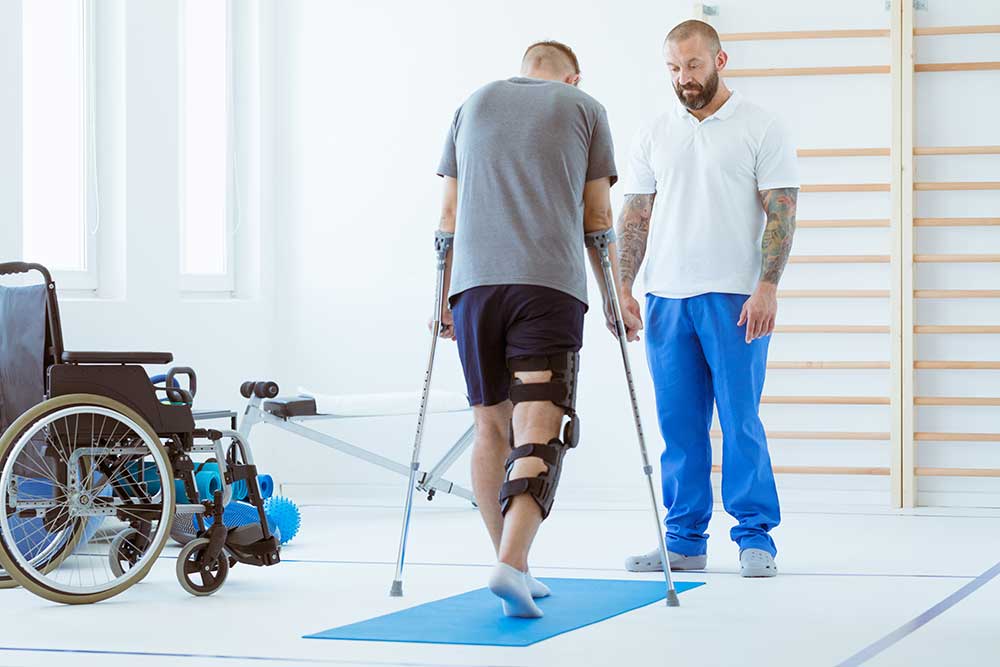Anger is a very common problem after brain injuries. When someone with a brain injury has a problem with anger, there are usually several causes acting in combination.
Some people are angry about the injury or problems that may have come with it, such as disabilities and loss of job, friends, money and control over one’s life. Some people were angry people before their injuries and still have that problem. People who have always been angry may need psychotherapy to help them learn to cope, and in some cases medication is required. (In our experience, people unfamiliar with the person or with brain injury are often too quick to assume that personality alone is to blame.)
But many people also develop impulsive anger as a direct effect of the damage to the brain. In other words, the parts of the brain that normally inhibit angry feelings and behavior have been damaged and do not do their jobs as well. This means that the person’s anger threshold is lowered so that he or she becomes angry more easily and more intensely. We can tell that this impulsive anger is directly due to the brain injury when:
- The anger begins with the brain injury or is made much worse by it
- Angry feelings come and go relatively suddenly
- Anger episodes may be in response to minor events
- The person having the angry episodes is surprised and embarrassed or distressed by them
- The anger is made worse by physiological stress such as fatigue, pain or low blood sugar
This was the problem Joe had. Joe was a quiet man, an accountant; active in his church and an assistant little league coach. He never drank or used street drugs; he was healthy; and he had never been in a fight or in trouble with the law. He was well liked in the community. His wife said that he rarely got angry, and when he did he usually sulked.

When his car was hit by a drunk driver and Joe hit his head on the window, all that changed. He had been knocked out for five minutes but after he was checked out at the Emergency Room they sent him home. He went back to work a week later but had trouble concentrating and remembering. Worse, he started yelling at his wife and children, often for little things like laughing loudly at the TV.
One day at work, he broke a computer keyboard by hitting it with a stapler; and he sometimes tore up papers he was working on. After each of these episodes, he would be very embarrassed and apologetic. He came for help after loudly cursing at his daughter because she was playing with her program at a Wednesday evening church service.
With Joe, it was clear that he was having impulsive anger resulting from his head injury. When other more familiar causes of anger are also present, such as difficult personality, alcohol abuse, or anger at the injury itself, the impulsive anger resulting directly from the brain injury can get overlooked. It is important to try to identify and treat that part of the anger too.
Dealing with Impulsive Anger Resulting from Brain Injury
When a person with a brain injury first wakes up from a coma, they are usually disoriented and confused and often they are agitated. They do not understand what is going on around them, and they are not truly responsible for their own actions. It is up to the people taking care of then to keep them safe, even if this means restraining them or using medications when absolutely necessary. As they recover, they gradually come to be able to control their actions. Their staff and families can then gradually teach them about the best ways to manage their angry feelings. Because a person with a brain injury’s “anger thresholds” or “flashpoints” have been lowered, they need to relearn how to manage the changed reactions.
They need emotional rehabilitation in addition to physical and cognitive rehabilitation.
Understanding the Anger
The brain injury survivor is, in some ways, a different person. What makes him or her angry may be different. We need to learn what those things are. Here are some common factors that contribute to anger after brain injury.

Anger Factors
Stimulation factors:
- High noise or activity level
- Unexpected events
- Lack of structure
Personal factors:
- Frustration
- Fear or anxiety
- Embarrassment, shame or guilt
- Discovery or confrontation of problems
- Cognitive impairments – especially memory deficits and confabulation (remembering things that did not happen)
- Communication impairments
- Rigid thinking
Medical factors:
- Pain
- Fatigue
- Hypoglycemia (low blood sugar)
- Medications (levels low or high?)
- Alcohol or drugs
Anger Warning Signs
Speech signs:
- Loud high voice
- Cursing
- Name calling
- Threats
Behavioral signs:
- Making fists
- Increased movement and fidgeting
- Angry face
- Moving towards the object of anger
- Breaking things
- Throwing things
- Threatening people
- Searching for or picking up weapons
- Hitting, kicking and other forms of violence
Physiological signs:
- Fast breathing
- Fast heart
- Sweating
- Over-aroused
- Tense muscles
- Flushed face
- Bulging eyes
Mental signs:
- Fantasies of doing any of the speech or behavioral signs
- Negative thoughts about others
- Confusion
- Feelings of frustration
- Feelings of fear or anxiety
- Feelings of embarrassment, shame or guilt
- Feelings of hurt
Early Strategies
These strategies are for staff and families to use when the person with brain injury is too confused to be responsible for his or her actions. It is important for staff and families to remember during this time that the anger is due to the injury, and they should not take it personally.

Prevention
Make the environment safe
- Remove potential weapons
- Keep alcohol and drugs inaccessible
- Keep vehicles and dangerous tools inaccessible
Regulate Level of Stimulation
- Some need to avoid over stimulation
- Some need to be kept busy and distracted
Provide Appropriate Level of Supervision
- Provide the least restrictive environment possible
Provide Reorientation as Needed
- Much of the anger in an agitated confused and disoriented person can come from misperceiving and misunderstanding the situation
- Staff and families should frequently remind the person of where they are, what is happening and why
Management
Withdraw
- Leave the person alone for a short period of time if this can be done safely. As you leave, tell them briefly what you are doing and why. “You are beginning to get upset. We are going to leave you alone for a few minutes so you can calm down.”
Distract
- Change the subject, the focus of activity or the location
- Use a concrete object as a focus when possible
Reorient and Reassure
- Remind the person of where they are, what is going on and why
- Try to clear up misunderstandings when this can be done without renewing argument
- Direct the person in activities that may reduce agitation, such as guided relaxation
Self-Control Strategies
These strategies are to be phased in when the brain injury survivor has recovered enough learning abilities and awareness to begin to cooperate in learning to control anger.

“Back Off, Calm Down, Try Again”
Because the impulsive anger resulting from brain injury often comes and goes suddenly, an effective way to deal with it is for the angry person to back off, calm down and try again. This strategy can be phrased in the individual’s own words or whatever expression is comfortable such as “retreat, relax, return” or “take a break” or “time out”.
Back Off
When warning signs appear, the person should leave the situation and go to a safe place. Others will have to cue him or her to leave. If the person will not leave, the other people present should leave instead, if possible.
Practicing backing off when not angry (like a fire drill) will help this go more smoothly when it is really needed.
Calm Down
When the person has backed off to a safe place, he or she should work on claming down. Many techniques can be used to calm down including:
- deep breathing
- soft music
- meditation
- prayer
- closed eyes
- physical exercise
Preparing to Return
Once calm, the person may need to rethink the situation and prepare to return.
Reviewing a list of questions is a possible preparation;
- Do I need to apologize?
- Do I need to explain why I left?
- Do I need to tell anyone my feelings?
- What can I do to avoid this next time?
Here are some statements to encourage rethinking the situation;
- “I don’t hate my mother; I’m just angry with her”
- “Maybe she had a point I should listen to”
- “He’s not wrong, we just disagree”
Try Again
When the person returns from backing off and calming down he or she may need to
- apologize,
- talk through the issue,
- explain the backing off and feelings
- resume what he or she was doing.
Once a person has learned to back off, calm down and try again successfully, he or she can work on calming down in the situation without leaving.
Anger Cue Cards
Anger cue cards can be used to remind the brain injury survivor of their warning signs such as Loud Voice, Tense Muscles, Confusion, or Thoughts of Hitting. These cards should be carried by the person with a brain injury and optional copies can be placed where anger incidents often happen or where backing off takes place.

A Back Off card might say:
- “I’m feeling angry, I need to back off”
- Leave the room
- Breathe deeply
- Relax muscles.
Angry Reactions to Brain Injury
Anger at the cause of injury: The victim of an injury may be angry at the cause of the injury such as a drunk driver, an assailant, a corporation or a government. Such people often need help finding effective and satisfying channels for their anger. Often, they can talk this out with a trusted friend or family member.
Grief Reaction
It is part of human nature to grieve when we lose something, not just when someone dies, but also when we suffer an injury or illness. We try to find reasons for our losses. One part of a grief reaction is anger at what we think caused it. This anger can also get displaced onto any handy target. People can work through these reactions by talking out their feelings. This is such a human experience that it usually does not require a psychologist, just a trusted and understanding person. However, poor memory or judgment or emotional or personality problems can complicate grief reactions and psychotherapy may be needed.
Frustration
When frustration contributes to angry reactions, the person needs to be trying easier things. Specific preparation can also be given before difficult tasks. For example,
“Now it’s time to go shopping. I know this is sometimes frustrating for you. How will you know if you are starting to get frustrated, and what will you do about it?”
Normal, Legitimate Anger
People with brain injury still have legitimate reasons to get angry. If their legitimate anger is discounted, ignored or “treated”, they may get angrier. If they have expressed their anger inappropriately, their angry actions should be dealt with separately from their legitimate complaint. They should not get their way just because they made a fuss, but the complaint should not be ignored.
Brain injury survivors often have impaired judgment which can contribute to anger problems. Cognitive rehabilitation for judgment can help. People with these difficulties need to check their judgments with caregivers or people they trust. Alcohol and drugs can contribute to anger problems. The clearest solution is abstinence but abuse programs or counseling may be needed. Not taking prescribed medications can also contribute to anger problems. The doctor should be told if the medications have not been taken as directed and if there have been any problems.
Conclusion
Anger is a common problem following brain injury. It has many causes, and there are many solutions to be tried. The rehabilitation team, the family and friends and the brain injury survivor can all work together to understand and manage the problem to help the person with brain injury to work towards recovering self control.
Shared from the Brainline website





Pingback: [BLOG POST] Anger and Frustration After Brain Injury | TBI Rehabilitation